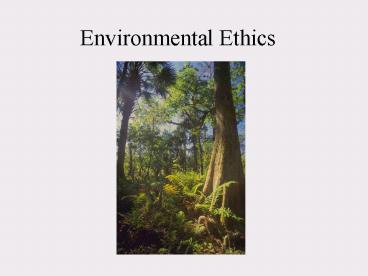Environmental Ethics - PowerPoint PPT Presentation
1 / 24
Title: Environmental Ethics
1
Environmental Ethics
2
We value things in two ways
- Instrumental (utilitarian) value valuing
something for its benefits by using it - Animals are valuable because we can eat them
- Intrinsic (inherent) value valuing something
for its own sake because it has a right to exist - Animals are valuable because they live their own
lives - Things can have both instrumental and intrinsic
value - But different people emphasize different values
- How we value something affects how we treat it
3
Environmental ethics
- Environmental ethics application of ethical
standards to relationships between human and
nonhuman entities - Hard to resolve it depends on the persons
ethical standards and domain of ethical concern
Should we save resources for future generations?
When is it OK to destroy a forest to create jobs?
Is it OK for some communities to be exposed to
more pollution?
Should humans drive other species to extinction?
4
People suffer external costs
- External costs include water pollution, health
problems, property damage, and harm to other
organism
5
Definitions
- Moral Agents
- Those who have the freedom and rational capacity
to be responsible for choices - Those capable of moral reflection and decision.
- Example adult humans of sound mind
- Infants and mentally infirm adults are NOT moral
agents
6
Definitions
- Moral Standing
- If you have moral standing
- Your continued existence or welfare is valuable
in itself (intrinsic value) - Your interests and well-being must be weighed
when deciding what is permissible to do. - Example humans of all kinds
- Babies, children, adults, old people, etc.
- Women, different races, different cultures
7
Definitions
- Moral Duties
- That which is owed by moral agents to those with
moral standing. - Example It is wrong to kill our children
because we have a moral duty toward them
8
Philosophical Issue
- Who or what has moral standing, and why?
- Does the environment have moral standing?
- Must look at criteria for moral standing
- What moral duty do we (moral agents) have toward
those with moral standing? - Different ethical positions suggest different
moral duties.
Yosemite National Park
9
Ideas on Criteria for Moral Standing
- Membership in the species Homo sapiens
- Humans have a soul
- Humans are moral agents
- and are responsible for knowing right from
wrong - Humans are intelligent
- Humans have personhood
- and self-consciousness
- Humans have language
10
Ideas on Criteria for Moral Standing
- Sentience, the ability to feel pain
- Therefore extend moral standing to animals
11
Ideas on Criteria for Moral Standing
- Being alive
- Therefore extend moral standing to animals and
plants - All living things.
12
Ideas on Criteria for Moral Standing
- Being part of nature
- Therefore extend moral standing to the
- earth
- ecosystems
- rocks
- rivers
- plants animals
- the entire natural world
13
Ethical Positions
- Anthropocentrism Human centered morality
- Only humans have intrinsic value and moral
standing. - The rest of the natural world has instrumental
value (use to humans).
14
Anthropocentrism
- We can best protect nature by looking out for
human needs. - Ex Ducks Unlimited preserves wetlands
- Ex Saving the rainforests will provide O2 and
medicines for humans. - Problem Would you blow up the world if you were
the last human
15
Ethical Positions
- Sentio-centrism Sentient-being centered morality
- All and only sentient beings (animals that feel
pain) have intrinsic value and moral standing. - The rest of the natural world has instrumental
value. - Both humans and sentient animals have rights
and/or interests that must be considered
16
Ethical Positions
- Biocentric Individualism Life-centered morality
- All and only living beings, specifically
individual organisms (not species or ecosystems)
have intrinsic value and moral standing. - Humans are not superior to other life forms nor
privileged, and must respect the inherent worth
of every organism - Humans should minimize harm and interference with
nature eat vegetarian since less land needs to
be cultivated.
17
Ethical Positions
- Eco-centric Holism ecosystem centered morality
- Non-individuals (the earth as an interconnected
ecosystem, species, natural processes) have moral
standing or intrinsic value and are deserving of
respect. - Individuals must be concerned about the whole
community of life/nature, - Humans should strive to preserve ecological
balance and stability.
18
Patriarchal Dualisms
- Greek, Roman, Hebrew
- Humans are separate from
- and superior to nature
- Human, mind, rationality, and man
- are linked and superior
- Nature, body, feelings, and woman
- are linked, and inferior
- Justifies domination by men over
- Nature
- Women
Aristotle
19
Ecofeminism
- Rejects Patriarchal Dualisms
- The domination of nature by men is wrong
- is similar to and related to the domination of
women by men. - Must break the pattern of "power over"
relationships - will benefit both women and the natural world.
Acid attack victims
20
Feminism
21
Deep Ecology
- Humans are deeply connected with nature.
- If humans identify with nature, then taking care
of the natural world will become part of taking
care of one's self.
22
Bioregionalism
- Lead a simple life with local production of food
and other products by people that you know - Increases environmental awareness and caring
- decreases exploitation of the environment and
people.
23
Three ethical perspectives
- Anthropocentrism only humans have intrinsic
value - Biocentrism some nonhuman life has intrinsic
value - Ecocentrism whole ecological systems have value
- A holistic perspective that preserves connections
24
The global value of all ecosystem services
- The global economic value of all ecosystem
services equals US46 trillion/Year - More than double the GDP of all nations combined
(Currently 18 Trillion/Year) - Protecting land gives 100 times more value than
converting it to some other use
The Story of Stuff

